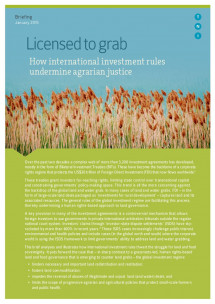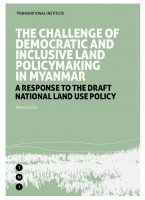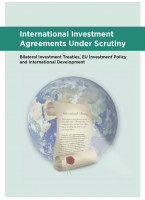Licensed to Grab How international investment rules undermine agrarian justice
The investor-state dispute settlement (ISDS) clause present in many trade treaties give investors far-reaching protection, curtailing governments’ ability to regulate for progressive agrarian and agricultural policies and reinforcing the notion of land as a commodity.

Authors
This regressive process hinders progress towards democratic land access and control and the reversal of abusive land deals.
Over the past two decades, the number of international investment treaties has expanded dramatically. This paper explores the consequences of these treaties for the attainment of land and food sovereignty, demonstrating how the global investment regime has countered grassroots-led, human rights-based forms of land governance by shifting the balance in favour of large-scale (agro)industrial actors.
Specifically the investor-state dispute settlement (ISDS) clause present in many of these treaties give investors far-reaching protection, curtailing, or threatening to curtail, governments’ ability to regulate for progressive agrarian and agricultural policies. As a consequence the notion of land as a commodity is reinforced, hindering achievement of democratic land access and control and the reversal of abusive land deals.
Over the past two decades a complex web of more than 3,200 investment agreements has developed, mostly in the form of Bilateral Investment Treaties (BITs). These have become the backbone of a corporate rights regime that protects the US$20 trillion of Foreign Direct Investment (FDI) that now flows worldwide.1 These treaties grant investors far-reaching rights, limiting state control over transnational capital and constraining governments’ policy-making space.
This trend is all the more concerning against the backdrop of the global land and water grab. In many cases of land and water grabs, FDI – in the form of large-scale land deals packaged as ‘investments for rural development’ – captures land and its associated resources. The general rules of the global investment regime are facilitating this process, thereby undermining a human rights-based approach to land governance.
A key provision in many of the investment agreements is a controversial mechanism that allows foreign investors to sue governments in private international arbitration tribunals outside the regular national court system. Investors’ claims through ‘investor-state dispute settlements’ (ISDS) have sky- rocketed by more than 400% in recent years.2 These ISDS cases increasingly challenge public interest environmental and health policies and include cases (in the global north and south) where the corporate world is using the ISDS framework to limit governments’ ability to address land and water grabbing.
This brief analyses and illustrates how international investment rules thwart the struggle for land and food sovereignty. It puts forward the case that – in sharp contrast to a grassroots-led, human rights-based land and food governance that is emerging to counter land grabs – the global investment regime:
- hinders necessary and important land redistribution and restitution;
- fosters land commodification;
- impedes the reversal of abuses of illegitimate and unjust land (and water) deals; and
- limits the scope of progressive agrarian and agricultural policies that protect small-scale farmers and public health.
This paper builds on an earlier paper by Tomaso Ferrando for TNI.





